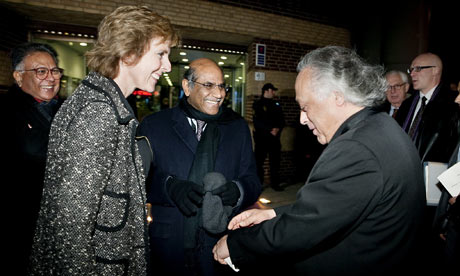Copenhagen destroyed by Danish draft leak, says India's environment minister
Confidential document reveals Obama's hardline US climate talk strategy

The chairwoman of the Copenhagen conference Connie Hedegaard greets the Indian environment minister Jairam Ramesh at a dinner before the summit last December. Photograph: Jens Astrup/AFP/Getty Images
The Copenhagen conference was destroyed from the start by the leak of the "Danish draft" negotiating text to The Guardian, the Indian environment minister said this weekend in a warning that the breakdown of international trust would continue to undermine climate talks this year.
In an interview with The Guardian ahead of a new round of meetings, Jairam Ramesh shed new light on last December's fraught summit and highlighted the continuing gulf between rich nations and the Basic block of emerging economies — Brazil, South Africa, India and China.
Dismissing Britain's attempt to blame China for the disappointment of Copenhagen, the Indian minister said the outcome was determined by a failed "ambush", targeted at the leaders of emerging economies, by the host nation Denmark. This attempted to switch a new negotiating text for the existing UN texts.
"The Danish draft was circulated at the beginning of the conference, which got mysteriously leaked to the Guardian. That completely destroyed trust. It was the leak of the Danish draft that destroyed Copenhagen from day one," said Ramesh, at a sustainable growth forum in Hainan.
The Danish text was a proposed compromise, which was confidentially circulated in advance of the conference to senior negotiators. Ramesh said he and his Chinese counterpart Xie Zhenhua had informally seen the document and pointed out which areas were unacceptable.
This back door negotiating track collapsed when the text was leaked before consensus had been reached, undermining the authority of the Danish chair, Connie Hedegaard.
"Yesterday Connie Hedegaard came to see me in Delhi and she admitted for the first time that the leak of the Danish draft was the death blow from which Copenhagen never recovered," said Ramesh.
The wide-ranging 30-page compromise draft was scrapped, leaving world leaders to scrabble for a replacement. Most of the negotiating was done during the frantic, final 24 hours, during which Basic nations formed their own huddle. According to Ramesh, their leaders had made it clear from the outset that they were not there to negotiate a document.
"That was not the objective of the head's of state meeting. It was bizarre to see heads of state arguing over English language, over punctuation. That was the job of the sherpas," he recalled, referring to the officials who do the preparation work for negotiations. "President Lula sat for half an hour and left because he realised what was happening. It was an ambush."
After the weak Copenhagen accord was unveiled, several European negotiators said China had blocked numerical targets, including a proposal from the German chancellor, Angela Merkel, that the 2050 goal would only apply to rich nations. Ramesh described this criticism as intellectual hypocrisy. He said a 2050 goal for rich nations would implicitly curtail the "carbon space" left for development by emerging economies, ie the amount of greenhouse gases that could be emitted without causing dangerous global warming.
"I told [Merkel], 'Madam, we are not against a global goal, but let us have clarity about how to assure equity to carbon space.'" Ramesh recalled. "That is big question mark even today. If you are not going to address issue of equity to carbon space you are not going to get India and China to agree to a global deal."
India and China are the core of the Basic group, which has begun holding quarterly meetings to coordinate its response to future climate negotiations. Its next gathering will be in Cape Town on 25 April, ahead of a ministerial meeting called by Merkel on 2 May to lay the political groundwork for talks later this year in Berlin and Cancun.
Ramesh was not optimistic about the prospects for progress. "I don't see 2010 being any different from 2009. There are certain key triggers for success that I don't see happening," he said, noting "disappointing" US efforts to reduce greenhouse gases, uncertainty about a promised $30bn in climate aid for the worst affected nations, and the absence of efforts to reduce the "trust deficit."
Efforts to improve the negotiating climate had not been helped, he said, by UK criticism of China's role. "I was appalled, frankly, that publicly high-level representatives of your government wrote comments in your paper about China's destructive role. Mercifully India was not mentioned in dispatches."
He was also scathing about reports that the US will not provide climate funds to countries such as Ecuador and Bolivia that failed to sign up to the Copenhagen accord.

No comments:
Post a Comment